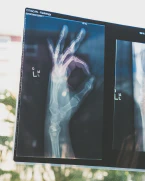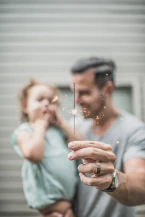Healing Childhood Trauma

Overcoming the Impact of Childhood Trauma on Relationships
Growing up, I witnessed firsthand the devastating effects of a tumultuous relationship between my parents. As a result, I knew that I didn’t want to follow in their footsteps and have a love like theirs. However, I didn’t realize how much their relationship would impact me until I was much older.
Years later, when I met someone and fell in love, I thought we would be together forever. But we too struggled with some of the same issues that my parents had. After nearly nine years together, we called it quits. We had a child, and although he was too young to understand what was going on, we knew that our breakup would impact him.
Despite the pain and heartache that came with our breakup, I was determined to put our child’s needs first. We struggled initially, trying to navigate this new space as co-parents. I asked myself, “how do we raise this beautiful boy full of wonder and promise and so much power, in spite of our failures as a couple?”
The answer for me was simple: choose love. That meant seeing the good in my child’s father as a father and not focusing on his missteps as a partner. It meant putting our child first every time, even if it meant I didn’t get my way.
We co-parented as allies and not adversaries, breaking the toxic pattern that we saw play out over and over again when parents lose focus on what’s most important - the children. We allowed our child to do things that our parents would never have allowed us to do. We cared his natural curiosity about the universe and his relationship to the world.
For us, co-parenting is so much more than scheduling pick-up and drop-off, playdates, or deciding what our child will wear or eat. It’s about helping each other carry the weight, unpack the load, and showing up in the world in a way that honors the beauty of our child.
Although it hasn’t been easy, we’ve managed to overcome the impact of childhood trauma on our relationship and have created a successful co-parenting dynamic that works for us. It’s not perfect, but it’s a model of what successful co-parenting can look like.
Overcoming Childhood Trauma to Build Healthy Relationships
Growing up in a household with parents who had a tumultuous relationship can have a profound impact on a child’s future relationships. I know this all too well, as I witnessed my parents’ on-again, off-again relationship and the violent incident that occurred when I was just 12 years old. It was a moment that I will never forget, and one that left me feeling numb and alone.
As I grew older, I realized that I didn’t want a relationship like my parents had. I wanted something different, something healthy and stable. But it wasn’t until years later, after meeting someone and falling in love, that I truly understood the impact that childhood trauma can have on relationships.
My partner and I had a beautiful son together, but after nearly nine years, we decided to go our separate ways. Our breakup was tough, but we made a conscious choice to co-parent as allies and not adversaries. We wanted to break the toxic pattern that we had seen play out so many times before, where parents lose focus on what’s most important - the children.
It was a struggle at first, but we found our way. We worked together to navigate this new space as co-parents, always putting our son’s needs first. We made a choice to choose love over fear, to see the good in each other as parents even if we weren’t able to make things work as a couple.
We allowed our son to explore and discover his world, caring his natural curiosity and never allowing our fear to put limits on him. We realized that the thrill of being in the moment, of being able to touch and be amazed by something new, was more valuable than any material thing.
For us, co-parenting is about helping each other carry the weight, unpacking the load, and showing up in the world in a way that honors the beauty of our son. It’s not always easy, but it’s worth it. And we hope that by sharing our story, we can inspire others to choose love and co-parenting as allies, building healthy relationships that can withstand the impact of childhood trauma.
Healing From Childhood Trauma to Build Strong Relationships
Traumatic experiences in childhood can have a lasting impact on our lives, especially when it comes to our relationships. It’s not easy to let go of the hurt and pain that comes with witnessing violence or experiencing neglect, but it’s possible to overcome these challenges and build a fulfilling life.
Growing up, I witnessed my parents’ on-and-off relationship, which impacted me deeply. My father once pointed a gun at my mother’s head, and while she managed to escape unscathed, the trauma and fear stayed with me for years. I didn’t want a love like theirs, and I was determined to create a different story for myself.
Years later, I fell in love and had a child. But, as we struggled with the same issues my parents faced, our relationship ended after nearly nine years. We knew we had to co-parent effectively and put our child’s needs first.
My partner and I decided to focus on building a relationship as allies instead of adversaries, breaking the toxic pattern that many parents fall into. We chose to prioritize our child and co-parent as a team.
We allowed our child to explore the world, to be curious and adventurous, without imposing our fears and limitations on him. We saw him as a unique individual with gifts to be cared and encouraged. We worked to foster trust between us, understanding that it was essential to coexisting as parents.
We may not have been perfect parents or people, but we honed each other’s roles in our child’s life. We focused on what was most important: our son’s growth and happiness.
We have found that co-parenting is much more than just scheduling pick-up and drop-off, playdates, and making decisions. It is about supporting each other and showing up for our child in ways that honor the beauty of his being. We hope that our relationship can serve as a model for others looking to co-parent effectively and heal from childhood trauma.
Healing from trauma takes time, patience, and a willingness to face and work through difficult emotions. But with dedication, perseverance, and the right support, it’s possible to overcome these challenges and build a better life for ourselves and our loved ones.
Seeking Professional Help Can Make a Difference
One of the most important steps in overcoming the impact of childhood trauma on relationships is seeking professional help. It can be challenging to work through these issues on your own, and having the guidance of a trained therapist can make a significant difference in your progress.
Therapists who specialize in trauma can help you explore the root causes of your issues and develop coping mechanisms to manage the impact of past trauma. They can also assist you in identifying patterns of behavior that may be causing problems in your relationships and teach you new communication skills.
It is essential to find a therapist who has experience working with trauma survivors and who makes you feel comfortable and safe. Building a trusting relationship with your therapist is crucial for healing and progress. Don’t be afraid to shop around until you find the right therapist for you.
Remember that healing from childhood trauma is a process, and it takes time and effort. But with the right support and guidance, it is possible to overcome the impact of past trauma and build healthy, fulfilling relationships in the present.
Overcoming the Impact of Childhood Trauma on Relationships
Growing up with a traumatic childhood can impact your relationships in many ways. It can create emotional distress, difficulties with trust and attachment, and a tendency to self-sabotage. These patterns can make it challenging to form healthy and lasting connections with others.
To overcome the impact of childhood trauma on relationships, it’s essential to first recognize and acknowledge the past experiences that have shaped your beliefs and behaviors. This process can be challenging, but it’s a crucial step towards healing.
It’s also essential to seek professional help if needed. A therapist can guide you through the process of exploring and understanding your experiences and provide you with tools to manage your emotions and behaviors.
Working on yourself and developing healthy coping mechanisms is crucial for overcoming the effects of childhood trauma on relationships. Mindfulness practices, self-care activities, and boundary-setting techniques can help you grow a stronger sense of self and build healthier relationships with others.
It’s important to remember that healing takes time, and there will be setbacks along the way. However, with perseverance and a willingness to work on yourself and your relationships, it’s possible to overcome the impact of childhood trauma and build fulfilling and healthy connections with others.
Overcoming the impact of childhood trauma on relationships
Childhood trauma can have a profound impact on our adult lives, including our ability to form and maintain healthy relationships. Whether the trauma was physical, emotional, or sexual abuse, neglect, or witnessing violence or addiction, it can leave deep scars that affect our behavior, thoughts, and emotions.
As a result, we may struggle with trust, intimacy, and vulnerability in our relationships. We may push people away or cling to them out of fear of abandonment, and we may repeat patterns of dysfunction and abuse that we learned in our childhood.
However, it is possible to heal from childhood trauma and build healthy relationships. It takes time, effort, and support, but it is worth it. Here are some tips that can help:
- Seek professional help: A trained therapist can help you understand the impact of your childhood trauma on your life and relationships and guide you towards healing and growth.
- Practice self-care: Taking care of yourself physically, mentally, and emotionally is essential for healing. This includes eating well, exercising, getting enough sleep, practicing relaxation techniques, and engaging in hobbies and activities that bring you joy.
- Learn healthy relationship skills: Reading books, attending workshops, and seeking the advice of trusted friends and family members can help you learn and practice healthy relationship skills, such as communication, conflict resolution, and emotional regulation.
- Be patient and compassionate: Healing from childhood trauma is a long and challenging process that requires patience, self-compassion, and forgiveness. Be gentle with yourself and acknowledge your progress, no matter how small.
Remember that healing is possible, and you deserve to have healthy and fulfilling relationships. By seeking help, practicing self-care, learning healthy relationship skills, and being patient and compassionate with yourself, you can overcome the impact of childhood trauma on your relationships and create the life you deserve.
Overcoming the impact of childhood trauma on relationships
Childhood trauma can have a profound impact on how we form and maintain relationships as adults. For some people, it can lead to feelings of insecurity, distrust, and difficulty opening up emotionally to others. These issues can make it hard to connect with others and form healthy relationships, which is why it’s important to find ways to overcome them.
One way to address the impact of childhood trauma on relationships is to seek therapy. A therapist can help you explore the root causes of your emotional barriers and work with you to develop strategies for overcoming them. This may include cognitive-behavioral therapy, which can help you identify negative thought patterns and replace them with more positive ones.
Another important step is to practice self-care. This can involve activities like meditation, exercise, and spending time with loved ones who support and encourage you. Self-care helps to build toughness and strengthen your ability to manage stress, which in turn can improve your emotional health and make it easier to form and maintain healthy relationships.
It’s also important to be patient with yourself as you work to overcome the impact of childhood trauma on your relationships. Healing is a process, and it can take time to develop new habits and ways of relating to others. But with the right support and tools, it is possible to build fulfilling relationships and find happiness in your personal life.
Overcoming the Impact of Childhood Trauma on Relationships
Childhood trauma can have a profound impact on an individual’s adult relationships. Trauma can affect attachment patterns, communication, and trust, among other things. But it’s important to know that healing is possible, and it’s never too late to start.
One of the first steps to overcoming the impact of childhood trauma on relationships is to recognize the ways in which it has affected you. Reflect on your attachment patterns, your communication style, and your tendencies towards trust or mistrust. It’s important to identify any harmful patterns or behaviors that may have developed as a result of your trauma.
Once you have identified the ways in which trauma has impacted your relationships, seek out support from a therapist or counselor. A trained professional can help you navigate the process of healing and provide you with tools and techniques to help you overcome any harmful patterns or behaviors.
In addition to seeking professional support, it’s important to practice self-care and self-compassion. Be patient and kind to yourself as you work through the healing process. Take time to do things that make you feel good and prioritize your own well-being.
Remember, healing from childhood trauma is a journey, and it’s important to take it one step at a time. With the right support and tools, it’s possible to overcome the impact of childhood trauma on relationships and build healthy, fulfilling connections with others.
Conclusion
Childhood trauma can have a profound impact on our relationships as adults, but it is possible to overcome this and build healthy, fulfilling connections. It is important to recognize the effects of trauma and how it may be affecting our behavior and thought patterns in relationships. With therapy and self-reflection, we can begin to heal and develop new ways of relating to others.
It’s important to remember that healing is a process and it takes time. It may be challenging at times, but with patience and persistence, it is possible to move beyond the negative effects of childhood trauma and build strong, loving relationships. By being mindful of our actions and reactions, communicating effectively with our partners, and seeking support when needed, we can create the happy and healthy relationships we deserve.
















